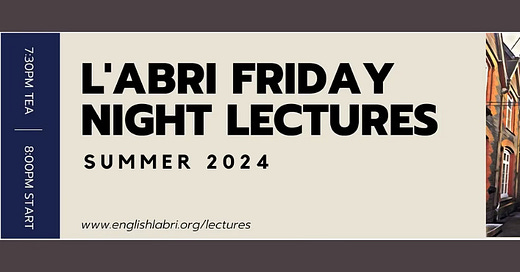Join us this Friday for our next lecture!
As always, you can join us for our lectures in-person or on Zoom. If you are attending in person, please come to the Manor House at 7:30pm for coffee and dessert. Otherwise, click the link below to join the lecture at 8:00pm.
The password is Lecture.
See below for our upcoming lectures
24 May - King Arthur and the dangerous dream of Christendom
Caleb Woodbridge, Writer & Editor
According to the legends, King Arthur was the Christian king of a Christian kingdom. But as the story has been retold in a post-Christendom culture, that's often been radically reinvented. How can the legend of Arthur help us think about the tension between the two cities, the city of man and city of God? How does the Arthurian mythos give us an index of changing attitudes to Christendom? From Geoffrey of Monmouth to recent retellings,the story of Arthur can both inspire us with dreams of a better kingdom, and warn us of the dangers of confusing earthly and heavenly kingdoms.
31 May – Christian Spirituality at the cutting edge of contemporary culture
Peter S Williams, Christian Philosopher & Apologist, (Southampton)
What's happening at the cutting edge of culture today, and what does it mean for the mission of the church? Christian philosopher Peter S. Williams will explain the nature of spirituality and culture and unpack the relationship between Abrahamic pre-modernism, modernism, postmodernism and metamodernism.
7 June – After Jesus and before the Written Gospels: What Did the Apostles Teach and How Do We Know This?
Dirk Jongkind, Senior Research Fellow, Tyndale House, Cambridge
Neither Jesus or the apostles seem to have written anything before or immediately after Easter. What we do have from this time are the evangelistic speeches in the Book of Acts. So where were the stories about Jesus’ life and teaching before they were written down eventually?
14 June – Enslaved by the Good: Identifying the Idols of Our Hearts
Joel Barricklow, L’Abri Worker
Far from primitive stone figures, the biblical idea of an idol is an extremely sophisticated concept. It helps us understand how even the best people, ideas, and goals can actually come to control our lives. Given this, how can we identify the idols of our hearts? When do good things become something that enslave us? And ultimately, how can we be freed towards lives even more full of good things without our security and significance resting in them?
21 June – Generative Beauty
Rebecca M. cross-cultural church planter in London
“Be the change you wish to see in the world,” declared Mahatma Gandhi. There is a profound awareness of the need for change as individuals reflect on the impact of global and system challenges as well as community challenges. People cannot just “be the change” until they themselves are first changed. Beauty is a powerful catalyst for change that begins with the individual, expanding to the community. We'll explore this both in traditional non-profit categories and then consider how beauty can be incorporated into intentional relational engagements.
28 June - TBA
5 July - The First Sexual Revolution: Liberation
Phillip Johnston, Hope Church Greatham
The Western world has been profoundly shaped by two sexual revolutions. The first brought liberation, the second disintegration. This lecture will take us to the first century CE to explore the liberating effects of the first sexual revolution in light of the rise of early Christianity.
12 July - The Surprising Rebirth of Belief in God
Justin Brierley, Broadcaster, Speaker, Author
Despite the increasing secularisation of the West, Justin Brierley believes we may be seeing a renewed interest in faith, even in our post-Christian culture. Having hosted conversations between Christians and skeptics for over 18 years, Justin will be speaking on why new atheism has grown old and secular intellectuals are considering Christianity again.
19 July - TBA
26 July - Why Can't I Feel My Faith?
Dr Tom Smiley, Psychologist
The felt experience of the Christian, with insights from psychology, theology, and philosophy.



